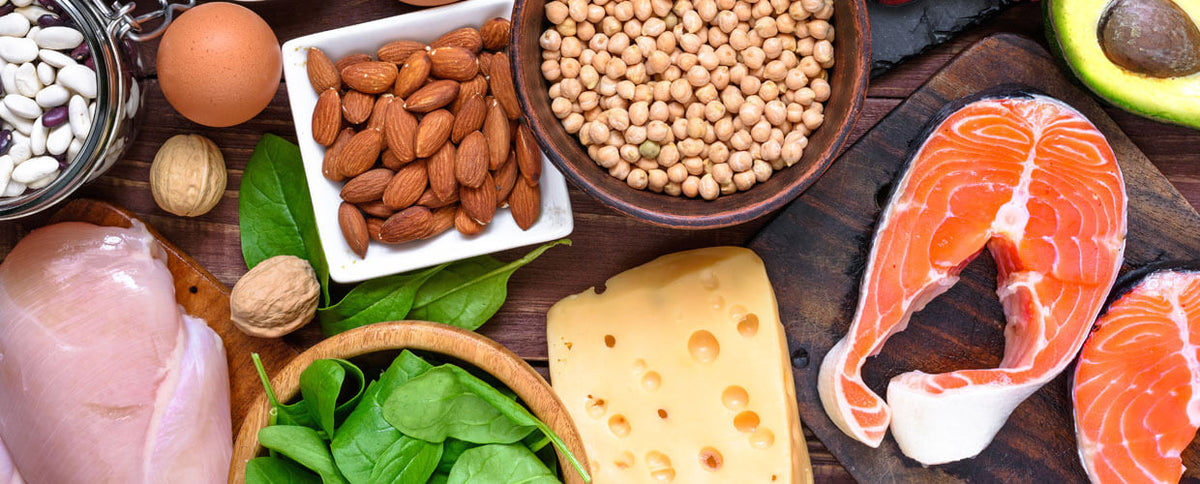The Protein Guide for Athletes: How Many Grams Do You Need?

Protein is essential to help you build, recover and repair muscles. But Spartans athletes ask us ALL the time, how much protein should I eat? So we pulled together this go-to guide on how many grams of protein per day you need. Find out here.
Whether you're training for a race, lifting heavy, or just flipping tires, your muscles are constantly being pushed to their limit. Every time you exercise, you break down muscle tissue, which then needs to be repaired and strengthened in the most efficient way, so you can test your grit all over again. This is where eating protein helps with recovery. Not just some protein, but enough and specific to your body's needs.
In general, athletes and active types require more nutrients, like protein and carbohydrates, than those who move less throughout the day. Studies show that if you fuel your body the right way – taking into account timing and food sources – you’ll prevent injuries, recover faster, and perform better. Added bonus: Protein can also help promote a strong immune system and normal organ function.
How Many Grams of Protein Per Day Do You Need?
In general, active people and athletes have the highest requirements. Endurance and strength training athletes, for example, need 0.5 to 0.8 grams of protein per pound of body weight. Your perfect protein number also depends on your body size as well as the type and length of your workouts. So, if you weigh 140 pounds and lift weights a few times a week, you would multiply 140 by 0.5 grams for a total of 70 grams of protein per day.
“For my main meals I try to get at least 20-40 grams and then another 10-15 grams in each of my snacks,” said Spartan Elite Racer Rose Wetzel. “For breakfast it’s usually oatmeal with flax and chia seeds, almond milk, and a simple protein shake. I love leftovers for lunch and then one of my go-to dinners is a baked herbed chicken with roasted potatoes.”
The Meal Breakdown: How Many Grams of Protein Per Day
Your workouts may vary from day to day, but sports nutrition experts have a general protein ballpark that you should aim for at every meal: 20 to 30 grams. What does that look like? Here are a few recommendations:
Breakfast
33g: Three-egg omelet with a quarter cup of shredded American cheese
Related: 9 High-Protein Breakfasts That Aren’t Eggs
24g: Yogurt parfait made with a single-serving size nonfat Greek yogurt (0.6 cups) and two ounces of almonds
18g-35g: Smoothie made with a scoop of protein powder
Related: 3 Post-Workout Nut Butter Smoothie Recipes
Lunch
30g: Two-cup serving of bean and meat-rich chili
35g: Salad topped with 4-ounce chicken breast
30g: Two hard-boiled eggs, a slice of sprouted grain bread topped with peanut butter, and one mini Babybell cheese
Related: 9 Easy Ways to Eat More Protein Throughout the Day
Dinner
24g: Grilled salmon burger
27g: Ground turkey lettuce wraps
22g: Stir-fry of zoodles (zucchini pasta) and tofu with a peanut dressing
Related: 6 Delicious Ways to Turn Your Dessert Into a Protein Powerhouse
Quick tip: Be sure to space protein-rich foods evenly throughout the day, ideally every 3-4 hours. While an extra lean steak or a chicken breast are an ideal source of protein, it’s not always convenient to carry around. Here are a few more popular protein-packed foods to help you hit your daily number.
Related: Eating Too Much Meat: Is it Possible?
“My favorite high-protein recipe is Chicken Adobo with quinoa and roasted kale,” Wetzel said. “I love it because I get protein from both the chicken and the quinoa, and the adobo sauce mixes nicely with the quinoa. I like to eat it on a day when I'm working my legs extra hard or when I do a heavy strength training day in the afternoon after a long run in the morning.”
| Food | Grams of Protein |
| 6 oz. canned tuna | 40 |
| 4 oz. chicken breast | 35 |
| 3 oz. salmon | 23 |
| 8 oz. yogurt | 12 |
| 4 oz. tofu | 10 |
| 8 oz. milk | 10 |
| 1 cup beans | 7 |
| 1 oz. nuts | 6 |
| 1 egg | 6 |
How Much Protein Should I Eat? Timing is Everything
Strategically, timing your meals and snacks (and front-loading them with protein) will help your body adapt to workouts and may help enhance recovery, no matter what type of exercise you're doing.
30 Minutes Before Your Workout: It's important to have a light snack to help prevent fatigue and improve performance. Try an apple or a pear with nut butter, a glass of chocolate milk, or a serving of chia pudding topped with nuts.
30 Minutes After Your Workout: It’s also key to replenish your muscles with protein and carbohydrates within a half hour of exercise to stimulate muscle building and repair, and help decrease muscle breakdown. Our favorite grab-and-go option is the Kashi GO Crunchy Peanuts & Peanut Butter Protein Bar with 12g of plant-powered protein from pea, peanuts and almonds.
2 to 3 Hours After Exercise: Eat a balanced meal to ensure you’re filling up your nutrient tanks and replenishing muscle protein stores for the next 24 hours.
Related: Why Muscle Recovery Is More Important Than Training
Before bedtime: If you're really trying to pack on as much muscle as possible, some scientific research suggests consuming another 20g of complete protein before going to sleep, so that your body doesn't spend as much time without muscle-repairing amino acids in the bloodstream.




